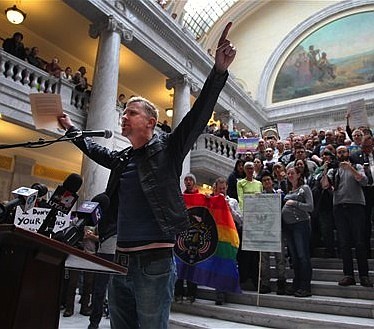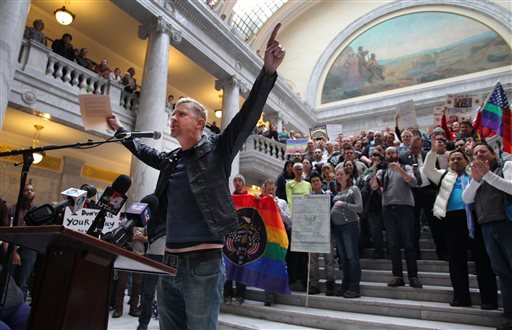OKLAHOMA CITY - In less than a month, two federal judges have struck down state bans on gay marriage for the same reason, concluding that they violate the Constitution's promise of equal treatment under the law.
Although that idea has been the heart of the gay marriage debate for years, the decisions in deeply conservative Oklahoma and Utah offer new momentum for litigants pressing the same argument in dozens of other cases across the country. And experts say the rulings could represent an emerging legal consensus that will carry the issue back to the Supreme Court.
The judge who issued Tuesday's decision in Oklahoma "isn't stepping out on his own," said Douglas NeJaime, a professor of law at the University of California, Irvine. "He's doing what a colleague in another court did not long ago."
The more judges who issue such rulings, the more authority other judges feel to render similar decisions, said NeJaime, who expects decisions soon from federal courts in Virginia and Pennsylvania.
An attorney for the plaintiffs in the Oklahoma case said the most important question is whether the Supreme Court agrees to decide the legality of gay marriage bans now or whether the justices bide their time.
"Will they take these two decisions or will they wait for more?" asked Don Holladay.
Litigants in more than three dozen cases are challenging gay marriage bans in 20 separate states.
A federal judge in Ohio last month ordered state authorities to recognize gay marriages on death certificates and signaled that although his ruling is a narrow one, it would undoubtedly incite more lawsuits challenging the state's ban.
Ian James, co-founder and executive director of FreedomOhio, a civil-rights group collecting signatures to put the issue before voters, has also been working on a lawsuit to have that state's gay marriage ban struck down.
James and his husband, who were married in Toronto in 2003, started working on their lawsuit long before the rulings in Utah, Oklahoma and Ohio. But those decisions have given their work renewed energy.
"Every step along the way actually helps to increase support because people just see the inequality and how we're treating people differently," he said.
Shannon Fauver, who represents two men seeking to have their marriage in Canada recognized in Kentucky, said the Oklahoma and Utah rulings do not directly affect the Kentucky cases, but he added: "Realistically, all the other judges are looking to see what's going on. It is a sea change that all the states are going this way."
The Supreme Court decision last summer to strike down part of the Defense of Marriage Act that defined marriage as between a man and a woman triggered the series of rulings we're now seeing, NeJaime said.
The judges in Utah and Oklahoma cited that decision heavily, essentially interpreting it to mean that same-sex bans are unconstitutional, he said.
Attorneys for same-sex couples have reminded federal judges that the high court said denying the right to marry "demeans" gay and lesbian couples and "humiliates" their children.
In the seven months since the landmark decision, the number of states allowing gay marriage has jumped from 12 to 17. In Utah and Oklahoma, the issue remains in limbo pending appeals.
Before Oklahoma's ruling this week, judges in New Mexico, Ohio and even heavily Mormon Utah all ruled in favor of same-sex marriage. Gay marriages in Utah have been put on hold pending a decision from the Denver-based 10th U.S. Circuit Court of Appeals.
The rulings in Utah and Oklahoma have added significance because they happened in states with histories of being strongly against gay marriage.
In 2004, Oklahoma's same-sex marriage ban was passed by 76 percent of voters and Utah's with 66 percent. Oklahoma also had a law that forbid state officials from recognizing adoptions by same-sex couples that were approved in other states. A higher court overturned that measure, NeJaime said.
"These decisions are coming out of states that didn't seem like they were in play long ago," NeJaime said. "It expands the movement in a lot of ways."
As gay-rights groups win cases around the country, the victories lead to more lawsuits, said Camilla Taylor, marriage project director at the national civil rights organization Lambda Legal. There are currently 43 gay marriage lawsuits active in courts, including 27 in the federal systems. A new one is filed almost weekly, she said.
The latest came from four couples in Arizona who filed a lawsuit Jan. 6 challenging the state's gay marriage ban two weeks after the Utah ruling.
A shift in public sentiment seems to be driving the movement. A third of Americans oppose gay marriage, down from 45 percent in 2011, an AP-GfK poll showed in October.
Twenty-seven states still have constitutional prohibitions on same-sex marriage. Another four -- Indiana, Pennsylvania, West Virginia and Wyoming -- forbid such marriages through state laws.
One scenario that could draw the interest of the Supreme Court justices is if federal appeals courts come out with different rulings on the issue, NeJaime said. The 10th U.S. Circuit Court of Appeals has a case pending out of Utah, and the 9th Circuit Court of Appeals has one out of Nevada.
If the Oklahoma case is appealed, the Denver-based court would get that case too. Appeals of possible rulings in Virginia and Pennsylvania would fall to other federal appeals courts.
Evan Wolfson, founder and president of New York-based Freedom to Marry, which seeks to have same-sex marriage bans struck down nationwide, does not expect the Oklahoma ruling to result in a shifting legal strategy or a flurry of new cases.
But, he said, it will strengthen the resolve of litigants, and it "reinforces rather than changes both the legal argument and the powerful moral argument."

